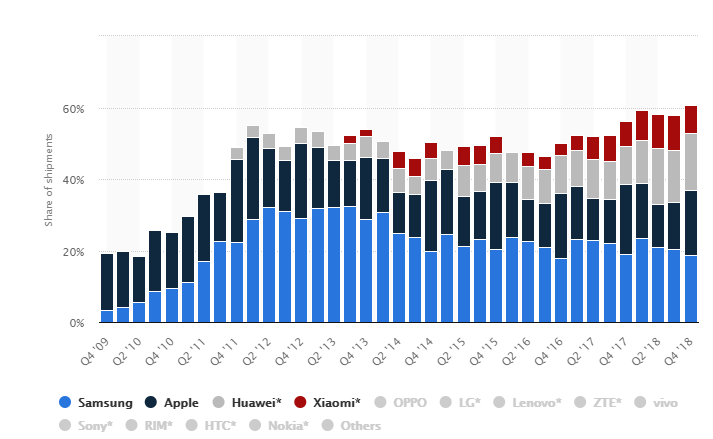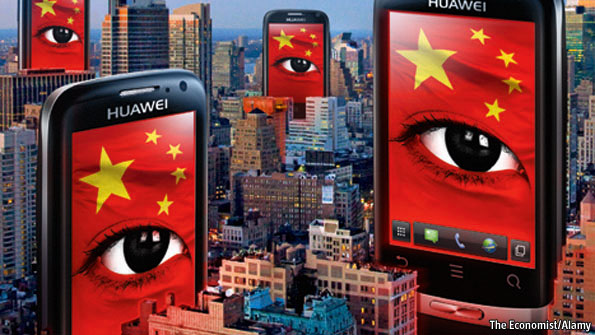In the last decade Samsung and Apple have dominated the smartphone industry with their rivalry being a driving force for innovation in the industry. Choosing between the two is a burden that many consumers face before purchasing their smartphone. However, while these two giants were busy fighting it out, it appears they failed to deal with a much greater threat – China.
In the last two years many Chinese smartphone brands such as Huawei and Xiaomi companies have began to penetrate the Western markets, gaining significant market share. In July of last year Huawei sold 54.2 million units to move into the second position with a record high market share of 15.8% (IDC, 2018). Chinese brands have grown in popularity largely due to their competitive hardware offered at a lower price.

While smartphones consumers may rejoice, hoping the increased competition will put pressure on Apple and Samsung, not everyone shares the same enthusiasm. As the overall Chinese economy grows rapidly and they gain global influence, superpower nations are keeping a close eye. It’s clear that countries such as the UK and the USA are looking to protect themselves from possible threats to their security, economy and even possibly their culture.
While smartphones may seem trivial in the context of this issue, the growing popularity in these devices is being take very seriously by both the US and UK government. Western society’s reliance on smartphones leaves many vulnerable and has created a fear that these devices could be used to spy on the population or influence behaviors.
In order to nullify this threat the US government has taken many measures. The Trump administration has already banned the use of Huawei equipment by U.S. contractors over security fears and recently ordered the arrest of the CFO of Huawei on fraud charges. Many countries such as Australia have followed suit and have banned Huawei from their networks. It is also rumored that the president is close to signing an executive order banning use of Huawei gear in all U.S. networks. (Pressman, 2019). Last year it was believed that Huawei was close to reaching a deal with American network carrier AT&T but it soon fell apart because of pressure from U.S. government officials. Verizon had also reportedly been in talks for a similar deal (Baig, 2018). The escalating and well-documented trade war between the two nations has also resulted in a 25% tax on many electronic goods, with the USA attempting to cancel out consumer price savings (Brandom, 2018).
Countries are going as far as having departments created to check imported Chinese technology for spyware. In the UK, Huawei and others are checked and monitored by a special company laboratory overseen by government and intelligence operators (Griffen, 2018).

When I first heard about these operations, thoughts of a paranoid conservative parties came to mind, however these worries are not entirely unfounded. In 2016, a security firm Kryptowire said tens of thousands of Android phones, sold at Amazon from a Miami-based company that was selling rebranded Chinese phones, were secretly transmitting text messages, contact lists and call logs to servers in China. The firmware on these phones is managed by a company based in Shanghai (Baig, 2018).
Many have rubbished these claims, questioning what do big brands such as Huawei have to gain out such operations and many have made the argument that the Chinese are the suppliers of most semiconductors for Western technology and appliances. Therefore, if we are worrying about Chinese smartphones, shouldn’t we be looking at all electronics for malware (Perlow, 2018) ?
We have to wait and see if Chinese companies can overcome political fears and gain the trust of Western consumers. Consumers may even be willing to tolerate the risk to obtain the tech they want at a reduced cost ?
References:
Baig, E. C., 2018. Spy games: Is buying a Chinese smartphone risky?. [Online]
Available at: https://eu.usatoday.com/story/tech/columnist/baig/2018/02/27/chinese-espionage-huawei-zte-congress/356095002/
[Accessed 23 February 2019].
boingboing.net, 2019. Redditor claims Chinese border guards installed malware on his phone. [Online]
Available at: https://boingboing.net/2018/06/05/universal-uighurification.html
[Accessed 25 February 2019].
Brandom, R., 2018. How Trump’s tariffs will hurt US tech companies. [Online]
Available at: https://www.theverge.com/2018/9/18/17873440/trump-tariff-china-tech-apple-trade-war
[Accessed 24 February 2019].
Griffen, A., 2018. HUAWEI PHONE EQUIPMENT IN UK TO BE DISMANTLED AMID FEARS THEY COULD BE USED BY CHINA TO SPY ON PEOPLE. [Online]
Available at: https://www.independent.co.uk/life-style/gadgets-and-tech/news/huawei-5g-phone-masts-equipment-bt-ee-internet-data-chinese-government-a8669076.html
[Accessed 23 February 2019].
IDC, 2018. Smartphone Rankings Shaken Up Once Again as Huawei Surpasses Apple, Moving into Second Position While Overall Market Declined 1.8% in Q2 2018, According to IDC. [Online]
Available at: https://www.idc.com/getdoc.jsp?containerId=prUS44188018
[Accessed 25 February 2019].
Perlow, J., 2018. Paranoia will destroy us: Why Huawei and other Chinese tech is not spying on Americans. [Online]
Available at: https://www.zdnet.com/article/paranoia-will-destroy-you-why-chinese-tech-isnt-spying-on-us/
[Accessed 26 February 2019].
Pressman, A., 2019. How Huawei Is Battling U.S. Spying Allegations. [Online]
Available at: http://fortune.com/2019/02/27/mwc-2019-huawei-spying/
[Accessed 25 February 2019].
Statista, 2019. Global market share held by leading smartphone vendors from 4th quarter 2009 to 4th quarter 2018. [Online]
Available at: https://www.statista.com/statistics/271496/global-market-share-held-by-smartphone-vendors-since-4th-quarter-2009/
[Accessed 23 Fenbruary 2019].